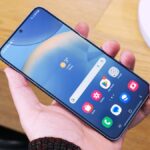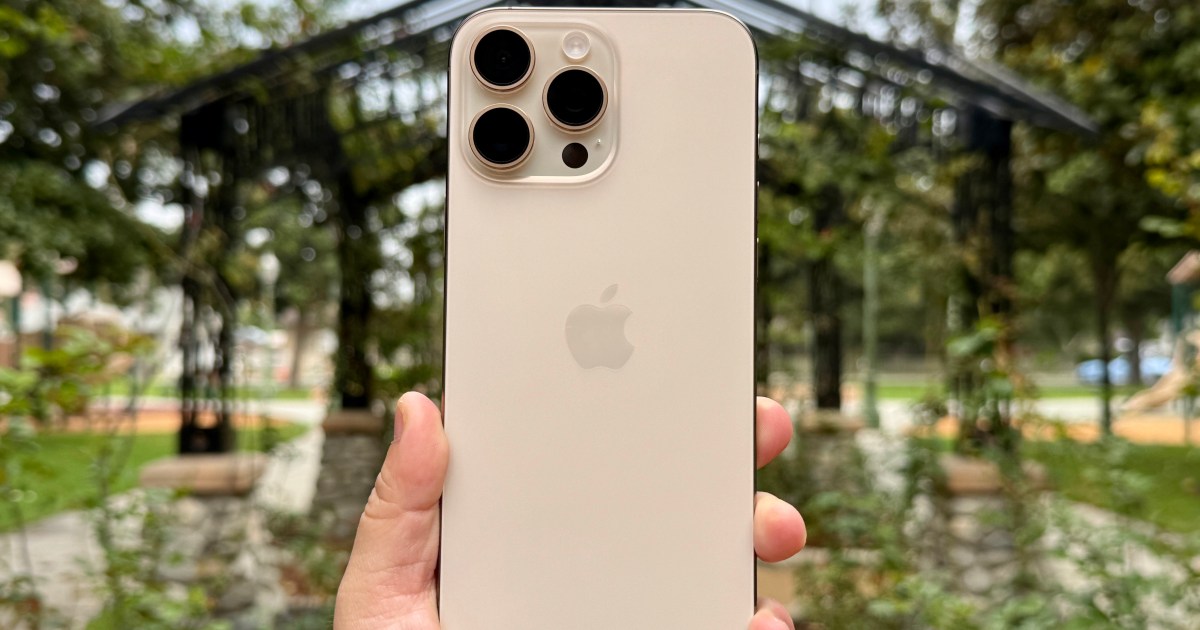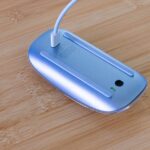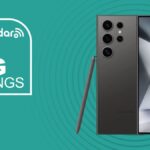iPhone 16 Pro Max
MSRP $1,199.00
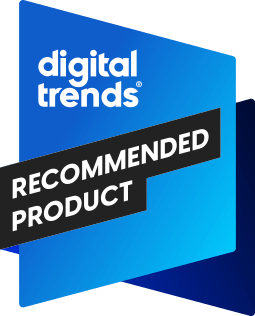
“If you like big phones and need all the latest and greatest features, it’s hard to go wrong with the iPhone 16 Pro Max.”
Pros
- Beautiful display
- Powerful performance
- Camera Control is a nice addition
- Great battery life
- Improved ultrawide camera
Cons
- It’s too darn big
- Boring colors
- Apple Intelligence not available yet
Apple’s iPhone 16 series is now available for everyone. There are four models in the lineup: the iPhone 16, iPhone 16 Plus, iPhone 16 Pro, and iPhone 16 Pro Max. All of these have the latest chips, an Action button, and Camera Control.
Personally, I’ve had every generation of iPhone since 2008, and when given the option, I tend to go for the smaller device. But this year, I got the iPhone 16 Pro Max to check out, and I have a love-hate relationship with it because of the size.
But looking beyond that fact, this is a fantastic iPhone and a worthy upgrade if you are coming from an older model.
iPhone 16 Pro Max: specs
| Dimensions | 163 x 77.6 x 8.25 mm (6.42 x 3.06 x 0.32 inches) |
| Weight | 227 grams (7.99 ounces) |
| Display | 6.9-inch Super Retina XDR OLED display
2868 x 1320 pixel resolution at 460 ppi 1-120Hz refresh rate 1,000 nits (typical) / 1,600 nits (HDR) / 2,000 nits (outdoor), 1 nit minimum |
| Durability | Latest-generation Ceramic Shield, IP68 |
| Colors | Black Titanium, White Titanium, Natural Titanium, Desert Titanium |
| Processor | A18 Pro |
| RAM | 8GB |
| Storage | 256GB, 512GB, 1TB |
| Software | iOS 18 |
| Updates | At least 5 years |
| Rear Cameras | 48MP Fusion (main), f/1.78
48MP ultrawide, f/2.2 12MP telephoto, f/2.8, 5x optical zoom |
| Front Camera | 12MP, f/1.9 |
| Battery | 4,685mAh |
| Charging | 30W fast charging (50% in 30 minutes)
25W MagSafe wireless 15W Qi2 wireless 4.5W reverse wireless |
| Price | Starts at $1,199 |
iPhone 16 Pro Max: design

While the base model iPhone 16 got a pretty modest redesign with the camera layout, the iPhone 16 Pro models look pretty much the same as last year, and the year before that.
Apple is still using the titanium frame with a brushed metal finish, flat edges, a matte glass back, and the Action button on the left-hand side, above the volume buttons. The triple-lens camera layout is also the same as before. The “latest generation” Ceramic Shield is on the front display, making it resistant to impact and scratches. In fact, if you look at an iPhone 15 Pro Max and an iPhone 16 Pro Max next to each other, you wouldn’t even be able to discern a difference at first.
Aside from Camera Control, the iPhone 16 Pro Max has an all too familiar design.
That is, until you look toward the bottom on the right edge of the frame. That’s where Apple has put in the new Camera Control button, which sits flush with the frame, rather than sticking out a bit like the other buttons. There’s a few things that you can do with the Camera Control, which I’ll get to in a moment, but that’s basically the key differentiator between the iPhone 16 Pro Max (and the rest of the iPhone 16 line) and previous generations.
The iPhone 16 Pro Max retains Apple’s overall design from the last several years — whether you love it or hate it, Apple seems to be sticking with the “if it ain’t broke, don’t fix it” motto.

It’s a tried and true design, for sure, but I have to admit that it’s growing a bit stale. I would have liked to see some changes made to the Pro models this year like Apple did with the base model iPhone 16.
The iPhone 16 Pro models also come in four rather uninspired shades: Black Titanium, White Titanium, Natural Titanium, and Desert Titanium. Seeing the incredibly saturated colors of the base model iPhone 16, the colors Apple chose for the Pro models are pretty dull. Desert Titanium isn’t as bad as I originally thought it would be, but it’s still not my personal preference of color.
iPhone 16 Pro Max: Camera Control

Now, let’s talk about the biggest new feature on the iPhone 16 hardware this year, including the iPhone 16 Pro Max: Camera Control. The Camera Control sits below the halfway point on the right edge of the frame, underneath the sleep/wake button.
I’ll be honest here: I don’t particularly like where Camera Control is located. As I’ve been using the phone, I often end up pressing the Camera Control unintentionally, and its current position requires me to adjust the way I hold the phone when taking landscape photos. The default pressure sensitivity for actually pressing the button is also set a bit too high for my liking, which can cause camera shake when capturing a photo.
I feel like Apple should have moved the Camera Control down a bit, closer to the bottom, as that would have felt more natural when taking landscape photos, similar to a digital camera.
One press of the Camera Control launches the Camera (or another app that supports it), and another press captures a photo, while a press and hold starts a video recording. You can also do a double half-press to switch between various camera settings, and slide your finger on Camera Control to make adjustments.
Placement aside, I really like the Camera Control feature. I’ve been wanting a dedicated shutter button for the iPhone for a while, since Apple had one on its Smart Battery Case back in the day. With Camera Control now opening up the Camera app, I can remap my Action button to something else.

I’ve often been using Camera Control to launch the camera, but adjusting the settings via Camera Control have a bit of a learning curve, which I’m still adjusting to. After years of using the touchscreen controls to take my photos and video, it’s a very hard habit to break. And unless I use Camera Control with both hands, I don’t like the fact that pressing it to capture can cause camera shake, which is not the best, especially for low-light scenes.
Perhaps it may have been easier to press if it didn’t sit flush and stuck out like the other buttons. I’m still tinkering around with Camera Control and trying to use it more, but I have a feeling this might end up the way of the Touch Bar on MacBooks.
iPhone 16 Pro Max: display

The iPhone 16 Pro Max has a massive 6.9-inch Super Retina XDR OLED display with ProMotion and always-on technology. Its resolution is 2868 x 1320 pixels at 460 pixels per inch (PPI) density. Typical brightness is 1,000 nits, 1,600 nits for HDR content, and a maximum of 2,000 nits outdoors.
This year, the Pro models can also get all the way down to 1 nit minimum brightness, which means less eye strain when using your phone in dark environments. The Dynamic Island also makes a return.
So far, I have had no issues with the display on the iPhone 16 Pro Max. There has been some talk online about how the Pro models aren’t always locked in at 120Hz refresh rate when doing various things on the phone, but honestly, I don’t care. Apple does state that it has adaptive refresh rates up to 120Hz, and in my daily use, scrolling is smooth and switching between apps is seamless. I also haven’t had any stuttering or choppy frame rates when it comes to my use either.
I have had no issues with the display on the iPhone 16 Pro Max.
The iPhone 16 Pro Max looks great. I’ve preferred how the iPhone keeps the display looking fairly neutral, whereas, on some competitor phones, the display is set to “Vivid” by default, which makes things overly bright. Colors still pop on the iPhone 16 Pro Max, and blacks are rich and deep.
For the size of the display, I’m not a big fan of the 6.9-inch screen. For me, it’s just too big. It’s impossible for me to use one-handed, and even two hands can cause fatigue for me after extended periods.
It’s a beautiful display, don’t get me wrong — I just don’t care for the size and prefer the smaller iPhone 16 Pro.
iPhone 16 Pro Max: software and performance

The iPhone 16 Pro Max ships with iOS 18 out of the box. However, though the entire iPhone 16 line was built for Apple Intelligence, the AI features won’t arrive until iOS 18.1 rolls out later in October.
Thanks to the A18 Pro and 8GB RAM, the iPhone 16 Pro Max is speedy in daily use and performance. There’s still plenty of cool new features in iOS 18 as well, despite not having Apple Intelligence, though some of the experiences are rather, frustrating.
The biggest change that you’ll notice from the get-go is the new home screen customization options. You can put your app icons and widgets anywhere on the screen, even with blank spaces. However, there are limitations like no 2×2 widgets in the middle, and sometimes the app icons just like to do their own thing while you’re rearranging, which can lead to wanting to tear your hair out.
The iPhone 16 Pro Max is speedy in daily use and performance.
I do really like having the Dark theme for app icons and widgets, however, as I always keep my phone in dark mode. This has led me to stop using custom icons through Shortcuts, though the dark theme icons also depend on the developers supporting the feature.
You can now also change your Control Center layout and even lock screen shortcuts. I did change up the Control Center a bit, but I’ve been stuck on muscle memory for years, so rearranging everything and adding new controls has taken some time to get used to. The same goes for the lock screen shortcuts. I don’t like that it can be a bit of a tedious process, though, as moving controls around even the slightest bit can shuffle everything else.

Messages got some nice upgrades too, with support for RCS messaging with Android users, as well as the ability to schedule iMessages to send later. I’ve been loving the RCS support as now photos and videos with Android users won’t be pixelated and unusable, but actually high resolution. And Photos has a big new redesign, though it’s either “love it” or “hate it” with most people. I think I fall in the latter.
Since most of the iOS 18 features that Apple showed off use Apple Intelligence, which isn’t available yet, these have been the biggest changes for me. We’ll definitely be trying out the Apple Intelligence features once they drop and will update this review accordingly.
As far as software support goes, Apple has been pretty good about it. Most of its devices last at least five years, and that applies to the iPhone 16 Pro Max as well.
iPhone 16 Pro Max: cameras

If you’re looking to get a new iPhone for the cameras, you can’t go wrong with the iPhone 16 Pro and iPhone 16 Pro Max. Both phones have the same triple-lens camera setup this year, so even if you get the smaller Pro, you aren’t missing out on camera features.
The iPhone 16 Pro Max (and regular iPhone 16 Pro) have a 48MP Fusion camera (Apple’s new marketing term for the primary camera), a 48MP ultrawide lens, and a 12MP telephoto camera with 5x optical zoom. Unfortunately though, the selfie camera is still the same at only 12MP.
So far, I’ve been very impressed with the quality of photos I’ve captured with the iPhone 16 Pro Max. As someone who only had the iPhone 15 Pro last year, I’ve really enjoyed having the 5x optical zoom with both Pro models this time around. Photos I’ve taken look true to life with colors that pop, detailed textures, and overall sharpness. Macro photos are also improved with the new 48MP ultrawide lens.
The entire iPhone 16 family also has the new Photographic Styles, which lets you fine-tune the tone and color of your photos, rather than just applying a generic aesthetic on the entire image like before. And the style can be changed after the fact too, which is a big improvement.
Aside from the telephoto camera, the Pro models have other features that also differentiate themselves from the base model iPhone 16. These features include Apple ProRAW shooting, night mode portraits, 4K Dolby Vision recording at 120fps, ProRes video recording, Log video recording, and there is also a “studio-quality” four-mic setup.
These are for sure great features if you’re a YouTuber or plan to create your own film. But for the average person, it may be more than necessary. Still, if you really want the telephoto and new ultrawide camera, then the Pro models are the way to go.
iPhone 16 Pro Max: battery life and charging

Since the iPhone 16 Pro Max has the largest battery in the lineup, it should be no surprise that battery life has been excellent.
The iPhone 16 Pro Max has a 4,685mAh battery inside, which can easily last a day and then some. Since I get fatigued after long periods of time with the Pro Max size, my use of it has been a bit lighter than normal. That said, it lasts at least two full days before I plug it in. For someone who can deal with the large size and use it more heavily, I’d imagine you can get at least a full day and a half. It’s much better than the battery life we got from the regular iPhone 16 Pro.
Apple didn’t make any improvements to charging speed when plugged in, unfortunately. You still have about 27W-30W wired charging speeds, which means about 50% charge in 30 minutes. MagSafe wireless charging is faster, however, now at 25W instead of 15W. Wireless charging with a Qi2 charger is now 15W, and reverse wireless is 4.5W.
iPhone 16 Pro Max: price and availability

The iPhone 16 Pro Max is available to buy now directly from Apple, retailers like Best Buy and Amazon, or carrier stores starting at $1,199 for the 256GB model, $1,399 for 512GB, and $1,599 for 1TB. If that’s a bit high, you can look for trade-in deals to knock off some dollars from the retail price.
A great alternative to the iPhone 16 Pro Max is the Google Pixel 9 Pro XL. You can get a 128GB model for $1,099, but the 256GB option is the same price as the iPhone 16 Pro Max at $1,199.
The Pixel 9 Pro XL has a 6.8-inch Super Actua OLED display with variable refresh rate between 1Hz to 120Hz and 3,000 nits of brightness. The triple-lens camera system is also a bit better with a 50MP main camera, 48MP ultrawide lens, and 48MP telephoto camera with 5x optical zoom, and a 42MP selfie camera. With Tensor G4 and 16GB RAM, along with a 5,060mAh battery, the Pixel 9 Pro XL has incredible performance and battery life. You also get Google Gemini and other AI features already out of the box, and the Pixel 9 Pro XL comes in a beautiful Rose Quartz color too.
iPhone 16 Pro Max: verdict

If you can handle the size and need the telephoto and improved ultrawide lens, then the iPhone 16 Pro Max is worth it, especially if you’re coming from an older iPhone. I don’t think I can really recommend it if you are using an iPhone 15 Pro Max, since that will also get Apple Intelligence once that rolls out. The iPhone 16 Pro Max is a pretty iterative upgrade if you’re coming from the last generation.
It’s also a little tricky to recommend either Pro model over the base iPhone 16. The regular iPhone 16 and iPhone 16 Plus have the Action button, Camera Control, improved ultrawide lens (though it’s only 12MP, not 48MP), new Photographic Styles, A18 chip, great battery life, and a better color lineup. For the first time in a while, the non-Pro iPhones are more appealing than their Pro siblings.
The iPhone 16 Pro Max is worth it.
Why upgrade to the iPhone 16 Pro Max, then? The telephoto lens, the always-on display with a 120Hz refresh rate, and the advanced photography and video recording capabilities. If you need those extra features, the iPhone 16 Pro Max won’t disappoint you.
Read the full article here


